UPDATED: Follow Peter Blair Henry's most recent research and writings
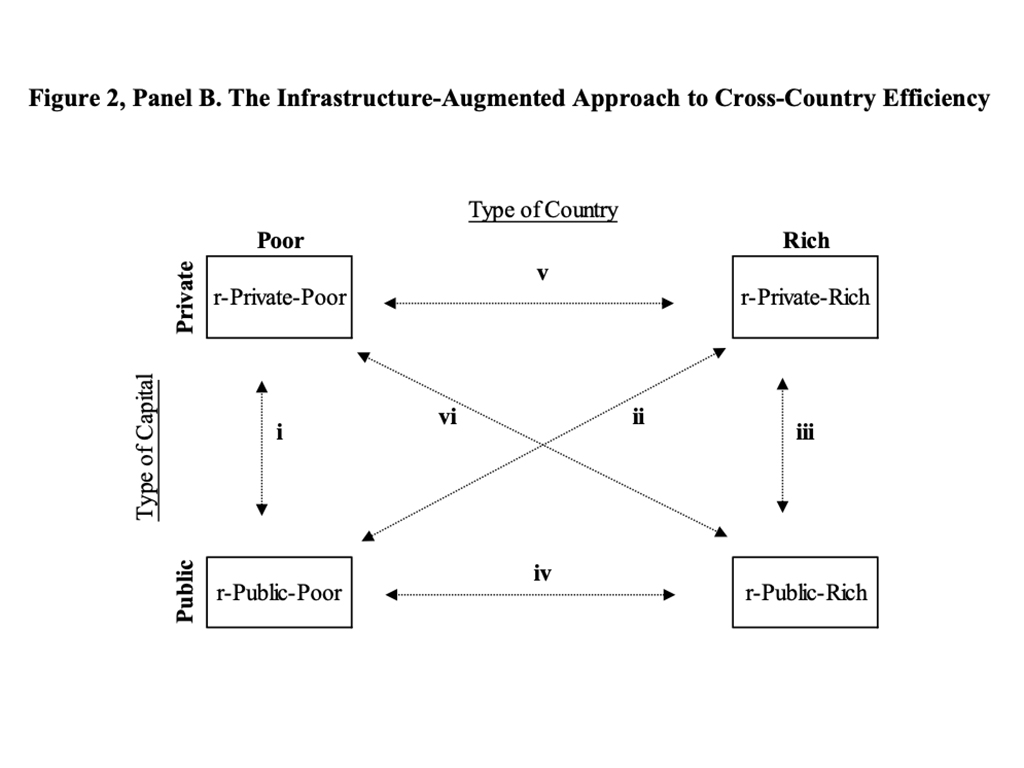

UPDATED: Follow Peter Blair Henry's most recent research and writings
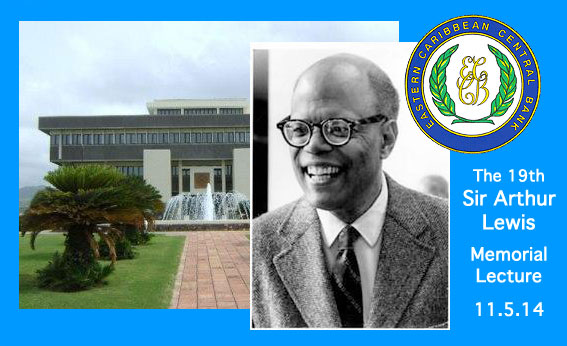
 05 Nov 2014 (St. Kitts) — When the FT asked me a couple years ago for a piece that featured an influential thinker whose work shaped my professional life, I didn’t hesitate and wrote this article on Sir Arthur Lewis, the pioneering economist and Nobel Laureate from St. Lucia in the Caribbean. That article focused on business education and the good things that come from coupling serious scholarship and public engagement, research and practice. (For those who know me, this angle is no surprise: I try to bring “and” thinking with me wherever I go.)
05 Nov 2014 (St. Kitts) — When the FT asked me a couple years ago for a piece that featured an influential thinker whose work shaped my professional life, I didn’t hesitate and wrote this article on Sir Arthur Lewis, the pioneering economist and Nobel Laureate from St. Lucia in the Caribbean. That article focused on business education and the good things that come from coupling serious scholarship and public engagement, research and practice. (For those who know me, this angle is no surprise: I try to bring “and” thinking with me wherever I go.)
In addition to exemplifying a life of active thought leadership, Lewis’s intellectual fingerprints are all over the emerging market boom. He saw parallels between the industrial revolution in the United Kingdom and the eventual movement of labor from fields to factories across the developing world (see China’s economic turnaround), and he brilliantly articulated the virtuous cycle of excess labor, profitability, and capital accumulation and reinvestment that drives employment and growth.
Today in lovely St. Kitts, I have the honor of delivering the 19th Sir Arthur Lewis Memorial Lecture, at the Eastern Caribbean Central Bank (ECCB). It’s a poignant moment for me personally, not only because of my deep admiration for Arthur Lewis but also because the ECCB gave me my first job as a professional economist: in 1994, following my first year of graduate school, I spent the summer in the ECCB research department, where I wrote a paper on the role of capital markets in economic development.
The focus for my remarks tonight is “Capital and Labor in the 21st Century: a Cautionary Tale.” Why cautionary? Because two seemingly unrelated trends gathering force today, when examined together and through the lens of the Lewis model, spell potential trouble for global prosperity within the next few decades: the approaching boom in the working-age population of developing countries and a rising tide of anti-capitalist sentiment within developed nations.
I will not give more away in advance of tonight’s lecture, but I will say this: dreams of prosperity should not breed a zero-sum mentality. Income inequality is a serious concern, but those who propose to fix it with policies that are inimical to business and capital are, at best, misguided. We have only to look at the history of economic policy choices across the developing world—including those in the Caribbean, where I am lucky enough today to enjoy sun and sea breezes—to know that this is so.
With deep gratitude and a full heart, I thank the ECCB and its governor, the Honorable Sir K. Dwight Venner, for inviting me to give the Lewis Memorial Lecture. I hope to do his memory proud.

26 Oct 2014 — How do you say “Turnaround” in Chinese? (Answer: Huízhuǎn) After months of biting my tongue, I’m pleased to finally announce that the Mandarin edition of Turnaround: Third World Lessons for First World Growth, has been published by China Machine Press. You can see Turnaround’s product page on dangdang.com.
The transformation of China’s economy during the past few decades, with millions of workers moving from fields to factories, is now the stuff of economic legend. The World Bank estimates that between 1980 and 2007, the Chinese economy lifted more than half a billion people out of poverty, and there is no doubt that the country’s rapid growth has reshaped the global economy as well.
Turnaround is about emerging nations more broadly (and what they can teach or re-teach advanced countries about economic discipline and prosperity), but Chapter Four devotes a bit of extra space to China. An excerpt from the section called “Catch Me if You Can” (beginning on p. 63 in the English language edition), explains the catch-up dynamic that helped create the modern manufacturing powerhouse China represents today:
In the framework of catch-up economics, China attained record rates of economic expansion because it managed to increase the growth rate of all three factors of production. It brought enormous quantities of people out of inactivity and underemployment in rural areas into gainful and more productive employment in the cities. China also promoted rapid rates of capital accumulation by permitting entrepreneurs to start their own businesses and keep the profits. Yet as important as capital and labor are for catch-up growth, ideas are the most vital input. Ideas range from new technologies–tractors instead of hoes, drip irrigation instead of buckets–to policies that provide incentives to employ both capital and labor more productively. By improving the productivity of existing resources, better ideas cause a country’s output of goods and services to expand even if its stock of capital and labor do not. The Chinese government increased the growth rate of ideas by “importing” policies that substituted many elements of a market economy for the elements of state planning. As investment became more profitable, foreign firms entered China, bringing with them still more new ideas–not about policy, but about things like supply chains, marketing, distribution, and sales.
With a seemingly unlimited supply of labor driving up productivity, plus new policies that encouraged capital accumulation and investment, a virtuous cycle of profitability took hold in China that allowed employment and income levels to go up and the country’s GDP to expand.
Yet it is unclear how long the current rate of growth in China can or will continue. Recent news headlines, including today’s Chinese Century article in The Upshot, convey more hesitation if not outright pessimism regarding China’s longer-term growth-rates. Certainly there is room for debate: future rates of growth could fall for reasons ranging from the simple arc of economic history (see The Upshot link above) to the reaching of a tipping point in China’s labor supply. In keeping with the themes of Turnaround, one might also imagine the effect on growth of any future shift in the country’s economic policies, particularly if brought about by rhetoric that is hostile to capital (think Picketty in the West) or that stems from resentment over matters of global economic coordination or trade.
This week, however, as I arrive in China for New York University’s Leadership Conference and, simultaneously, the incredible opportunity to launch in person the Chinese edition of my book, I am feeling optimistic and intend to focus on the positive lessons that China and Turnaround have to offer for all nations hoping to increase prosperity for future generations.
On Monday afternoon, October 27, I am honored to give the first in a series of talks that are part of NYU Shanghai‘s Pudong Forum on Economics, Business, and Finance. Q & A session and book signing to follow the talk.
On Thursday evening, October 30, China Machine Press will hold its book launch in Beijing, where I will give a talk titled: “East Meets West: Economic Reform and Win-Win Outcomes for Global Growth” at BiMBA, National School of Development at Peking University.
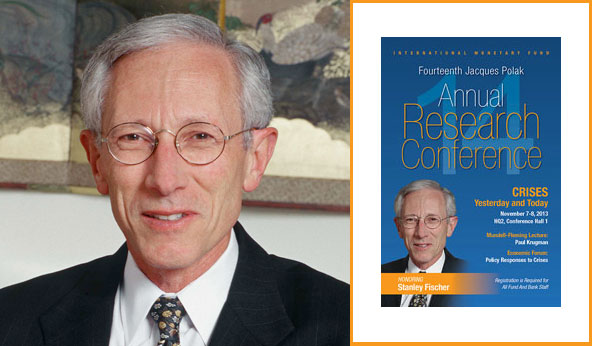
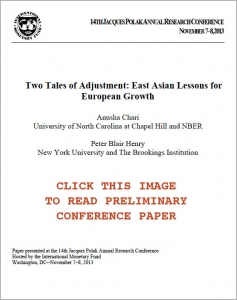 08 Nov 2013 — Today I have traveled to Washington D.C., where I am joining the IMF’s 14th Annual Research Conference already in progress. This year, the conference is focusing on the economics of crises, and I am pleased to be the coauthor of a paper that my colleague Anusha Chari will present: Two Tales of Adjustment: East Asian Lessons for European Growth. The paper focuses on the use of austerity in East Asia and in Europe, and concludes that the IMF, often derided as “It’s Mostly Fiscal,” may well stand instead for “It’s More Flexible” than you think—and than the European Union’s fiscal compact.
08 Nov 2013 — Today I have traveled to Washington D.C., where I am joining the IMF’s 14th Annual Research Conference already in progress. This year, the conference is focusing on the economics of crises, and I am pleased to be the coauthor of a paper that my colleague Anusha Chari will present: Two Tales of Adjustment: East Asian Lessons for European Growth. The paper focuses on the use of austerity in East Asia and in Europe, and concludes that the IMF, often derided as “It’s Mostly Fiscal,” may well stand instead for “It’s More Flexible” than you think—and than the European Union’s fiscal compact.
But the purpose of this year’s conference is also to honor Stanley Fischer, who has made innumerable important contributions to research and policy and who knows a thing or two about economic and financial crises. In addition, I am happy to say that he has been an important influence in my academic and intellectual life.
Among the many accomplishments that have piled up behind Stan’s name over the years—Head of the MIT Economics Department, First Deputy Managing Director of the IMF, Governor of the Bank of Israel, to name a few—the most significant to me is “dedicated teacher.”
Teachers matter. In the winter of 1994 at MIT, I experienced the privilege of taking my first graduate course in macroeconomics from Stan. Having then dared to hope that he might become my thesis advisor, I was crestfallen when the IMF whisked him away from MIT a few months later. Persistent (and perhaps foolhardy), in the fall of 1997—in the midst of the Asian Crisis and quite out of the blue—I sent Stan a chapter of my doctoral thesis that I was revising with the intent of sending it to a journal. It took a couple of hours to muster the courage to hit SEND, and I really didn’t even expect to hear back. But within a few days, I received a two-page reply with detailed comments and suggestions for improvement, which I took with gratitude. The paper was published and is still in many ways my most important article.
Today, Stan remains an important interlocutor, critic, and supporter. (He even had some kind words to say about my book TURNAROUND.) He is a dedicated teacher indeed, one to whom I am greatly indebted. I am pleased to participate with colleagues in this conference tribute to a remarkable man.
Thank you, Stan.

17 Sept 2013 (Jamaica) — Today I flew to Jamaica from New York. Descending over the blue of the Caribbean, I thought about my late father, George Arthur Henry. More than 35 years ago, he made the opposite journey, from Kingston to JFK, with our family of six in search of a more prosperous future than what Jamaica in the 1970s had to offer us. Returning now to the island where I was born, and doing so this time to present my research and ideas about economic policy, global prosperity, and how these impact people in places large and small, feels in many ways like coming full circle.
Dads matter. So do Moms. And brothers, sisters, aunts, uncles, cousins, friends, and neighbors. In the first chapter of Turnaround, I write about the influence my grandmother had on my life, on my understanding of poverty, and on my desire to examine its causes and possible solutions. [That’s my grandmother in the photo above, second from the left in the back row.] My grandmother—and my parents—gave me the gift of intellectual curiosity, but the greatest lesson I learned from my grandmother came not from any book but from her kindness toward a poor woman called Miss Mama. Over time,
I was drawn to [economics] because I wanted to help people in developing countries like my native Jamaica help themselves. Feeding the hungry [as my grandmother did] is an act of kindness. Providing the hungry with the means to feed themselves is an act of empowerment that confers dignity as well as nourishment. […] The economic policy decisions implemented in the months and years ahead will determine whether people eat or starve, live or die—and not just in emerging economies.
Turnaround (Ch 1, pp. 5, 6)
During the next couple days, I will have the pleasure of talking to Jamaicans about the country’s economic crossroads, the policies that lead to greater prosperity, and the important progress the country has made and must continue to make.
Consider Officer Cooper, whom I met on the way from the airport. As it happens, he read the Jamaica Gleaner article that mentions my event at the University of the West Indies (UWI), and he wanted to meet me. Thanks to him, his fellow officers, others in law enforcement and community activists, Jamaica has made great strides in breaking the grip of violence. This linked article in the New York Times on August 17, 2013, declares: “Jamaica is emerging as a rare bright spot in the hub of the fight against drugs and organized crime that extends across South America and the Caribbean.” This is one trend that must continue if Jamaica is to turn around its economy.
Another continuing investment must be in human capital through the university and other forms of education, which is critical to Jamaica’s future. The important role of education in creating opportunity is one reason why I am looking forward to speaking at the UWI Mona campus and to continuing meetings at UWI and the Mona School of Business and Management (MSBM) later this week.
As my time in Jamaica unfolds, I will send updates via Twitter.
For now, I will simply add that my heart is full—both with optimism when I consider this island’s future, and with gratitude when I reflect on my family and our shared history.
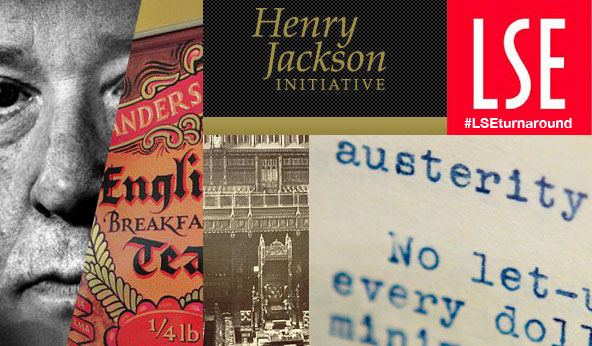
Those who know me, know that I like a good cup of tea. Those who've read or heard me talk about Turnaround know that I care somewhat less for austerity.
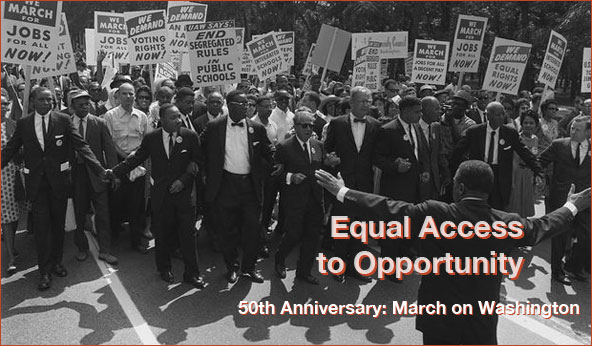
28 Aug 2013 — Marking the 50-year anniversary of the March on Washington, a watershed in the civil rights movement that motivated Congress to take action on inequality, Peter joins The Takeaway host John Hockenberry for a roundtable with guests Farai Chideya (writer-in-residence, NYU’s Journalism Institute) and George Packer (staff writer, The New Yorker) to discuss where we are now and where the next fifty years could (or should) take us.
Marchers in 1963 made their demands clear: fair labor standards, decent housing, desegregated schools, a higher minimum wage, and job opportunities. Despite a half-century’s progress, many of these basic needs remain unmet for too many Americans. While social equality is much improved from what it was, there is no denying the pain of income inequality in our current economy.
During the discussion, Peter focuses on education as the transformative key to leveling the playing field, improving lives, and ensuring economic growth. Currently, he says, “If you’re born in the United States in the top 25 percent of the income distribution, you have an 85 percent chance of going to college. If you’re born in the bottom 25 percent of the income distribution, you have an 8 percent chance of going to college. That is not equal access to opportunity.”
But in answer to the question of whether we are past a point of no return, and despite his assertion that we are a nation that’s lowered our expectations, Peter remains optimistic. “I’m in the business of education because education is about transforming people’s lives. We’ve got to pull people into the leadership class from the bottom of the income distribution. That’s the key to the future.”
listen to audio of the complete roundtable (Full segment 00:08:19)
Photo Credit: The March on Washington, August 28, 1963. United States Information Agency/Wikimedia.
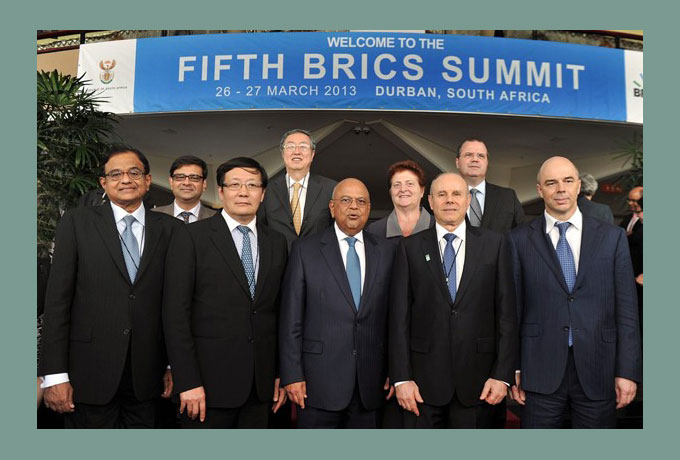
 Washington Post review by Jim Tankersley published online on March 26, 2013
Washington Post review by Jim Tankersley published online on March 26, 2013
“To grow, should U.S. look to Third World?”
EXCERPT: “[Peter Blair Henry’s] new book, Turnaround, straddles the developed and developing world. It reaches conclusions that run counter to a growing sense among many Americans that globalization has hurt the U.S. economy more than it has helped, especially for the middle class.
“Much of the book should please Republicans. Henry advocates reducing the federal deficit and reducing the ‘uncertainty’ that many business leaders and GOP lawmakers say is restraining growth. He also, in the interview, condemned ‘protectionist’ trade measures that the Obama administration and other developed countries have leveled at their emerging-market trading partners in recent years.
“But at times, Henry can sound more liberal. He warns against ‘eating our seed corn’ by cutting education, and he says, ‘Europe needs less austerity and more reform’ to liberalize its labor markets and encourage innovation.
“His fundamental point of view is a resounding belief that if developing countries can reverse a cycle of poverty and economic dysfunction and begin to grow rapidly, the United States can, too.”
Read the full article/review in the Washington Post
Photo credit: ELMOND JIYANE/AFP/GETTY IMAGES – Leaders from developing countries at the fifth BRICS summit in Durban, on March 26, 2013.